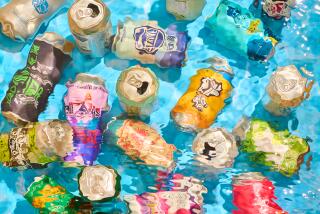Brewer Will Battle False Rumor About Its Product
- Share via
Corona Extra, whose astonishing success has been both a mystery and source of jealousy within the beer industry, is suddenly battling a mysterious problem of its own: persistent false rumors that it is contaminated. To be specific, with urine.
As a result, its major U.S. importer is about to undertake an extraordinary and high-risk strategy of answering the rumor in the news media.
“There’s a risk involved and we know that,” said Michael J. Mazzoni, executive vice president and general manager of Barton Beers in Chicago. “But we’ve reached the point where everybody’s going to know about it anyway, so why not tell the true story?”
Barton, which imports Corona into 25 Western states from Mexico City, traced the tale to a competing wholesaler in the Reno area in May. In an out-of-court settlement earlier this month, Luce & Son Inc., which carries Heineken and other beers--but not Corona--was obliged to declare publicly that Corona was “free of any contamination.”
But that wasn’t the end of it. Just as Procter & Gamble once faced rumors that its corporate symbol was linked to devil worship, the false story about Corona has taken on a life of its own. It has spread into Los Angeles and Orange counties, parts of Northern California and such cities as Phoenix, Seattle, Boise, Ida., Aspen, Colo., Minneapolis and Milwaukee. It apparently has hurt sales in some places and threatened to undermine one of the most spectacular success stories in the history of the beverage industry.
Corona representatives hoped that the vague accounts would fade after the settlement in U.S. District Court. But, according to Mazzoni, other competitors have continued to spread it, and--most disheartening--consumers are expressing worries about it. As a result, Corona has decided to go public with its dilemma, hoping to squelch the rumor by facing it head-on in the media.
Corona’s problems have nothing to do with contamination--but seemingly a great deal to do with competition in a tough industry faced with lackluster growth for much of the past several years. “I’ve never heard of a beer sample with urine in it,” said William Siebel, executive vice president of J. E. Siebel Sons’ Co. in Chicago, which tests the ingredients of Corona and other beers. “It (Corona) is a pure product with no contamination.”
It also is a product that caught the entire industry way off-guard after making a little-noticed entry into the United States in 1981. Packaged in a long-necked clear bottle, with a spray-painted blue-and-white label, Corona had cachet: It was favored by Southern California’s surfing crowd. Style-conscious beer drinkers caught on quickly, despite virtually no advertising. By 1986, Corona had moved up to second place among beer imports, behind Heineken, selling 13.5 million cases in the United States.
“Corona is one of the most extraordinary success stories in the history of beverage marketing,” Paul Gillette, publisher of Beverage Hotline, a Los Angeles-based industry newsletter said of the drink that typically is served with a lime wedge and is not known for a particularly distinctive taste.
Overall demand for Corona is so intense that distributors have been getting limited allocations this year. Nonetheless, Mazzoni said, areas in which the rumor has circulated for longer than five weeks have reported falling sales, and some stores have experienced sharp drops of 80%.
The U.S importer is gathering information for possible legal action against several other distributors who may have played a role in circulating the story. Luce executives declined to return telephone calls Monday on the subject. By some accounts, the story started with a report on the CBS television show “60 Minutes,” but a CBS spokeswoman said the show has done no reports on the subject of beer for the past four years.
Such a situation provides companies with the grim options of rumor control: They can decline to dignify the tale with a response and take the chance that it will go away, or they can try to meet it head-on and hope the truth wins out. The problem has been faced by fast-food companies, department stores and others in recent years.
In the case of Procter & Gamble, the giant consumer-products company tried to fight off the Satanism rumors--which were based on its moon-and-stars corporate symbol--with publicity and lawsuits. Ultimately, however, it decided to phase out the logo rather than endure the headache. Faced with a genuine case of sabotage to its Tylenol product, Johnson & Johnson preserved public credibility by conducting massive recalls and a disarmingly candid advertising campaign.
According to some observers, conditions in beer distributing have become more conducive to dishonest whispering campaigns due to growing competition and flat sales. “At the distributor level, it’s a common tactic. Things are so competitive,” said Tom Pirko, president of Bevmark Inc., which consults in the beverage industry. “People try to find whatever advantage they can.”
Paul Bretag, vice president of Quality Beer Distributors in Orange County, recalled that his initial response was to quietly assure sales personnel and retailers that the story was spurious--but only if they brought it up. The rumor wouldn’t die, however, and the distributor eventually instructed its representatives to query clients, in order to track it and contain it.
On a particularly disturbing day last week, for example, 35 separate retailers asked Bretag’s sales force about it. As a result, Bretag said: “I’m for breaking it in the media--so we can tell the truth.” Observers congratulated Corona on candidly facing the rumor problem. “The risk, of course, is that you give some people the idea that wouldn’t have had it in the first place,” said Gillette. “But I think that the risk is less than letting it go crazy on its own.”
THE TOP 10 IMPORTED BEERS Table is based on sales to retailers in millions of 2.25-gallon cases. The top 10 accounted for nearly 80% of the 121.8 million cases of imported beer that went to retailers in 1986.
1986 % change Brand Country Sales from ’85 1. Heineken Netherlands 35.7 +3.5 2. Corona Mexico 13.5 +170.0 3. Molson Canada 13.0 -0.8 4. Becks’s W. Germany 11.2 +13.1 5. Moosehead Canada 5.7 +3.6 6. Labatt’s Canada 5.5 +14.6 7. St. Pauli Girl W. Germany 4.3 -2.3 8. Amstel Light Netherlands 3.3 +37.5 9. Tecate Mexico 2.5 +25.0 10. Dos Equis Mexico 2.5 +4.2
*Source: Impact
More to Read
Inside the business of entertainment
The Wide Shot brings you news, analysis and insights on everything from streaming wars to production — and what it all means for the future.
You may occasionally receive promotional content from the Los Angeles Times.










